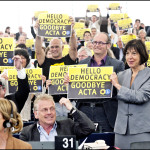Vienna City Council elections: the first electoral test for the refugee crisis

The Vienna City Council Elections held on 11th October 2015 were a setback for the far-right Freedom Party (FPÖ), but far from a knockout blow. FPÖ failed to win a majority in Vienna’s City Council elections, and the Austrian Greens are again set for coalition with the Social Democrats. But the triumph is bittersweet. In the first electoral test of an open policy towards refugees, anti-refugee voices have not been silenced and will only continue to grow.
The far-right Freedom Party (FPÖ) made big gains in this weekend’s City Council elections in Vienna, however, the Social Democrats (SPÖ) and their powerhouse mayor Michael Häupl have clung on. The SPÖ held enough seats to make possible the continuation of the coalition city government with the Austrian Green Party, which had been in office since 2010.
The SPÖ cut its losses to only a 5% fall, holding on to 39% of the vote and 44 City Council seats. The Greens restricted their losses to 1% and won 11% of the votes and 9 seats, enough to ensure a small majority in 100 seat council if the coalition is resumed.
The FPÖ were the big movers, gaining a 6% increase, to 32% of the vote, and 35 seats. The center-right ÖVP continued to shed votes to the FPÖ, and, in a surprising footnote to the election, the new centrist liberal party NEOS gained seats on the City Council for the first time.
The FPÖ leader Heinz-Christian Strache, who was also his party’s candidate for mayor, conceded defeat with 97% of the votes counted, saying “It didn’t work out today, but we came a step closer.” An ominous message for progressive Europeans.
Indeed, despite the victory there is no cause for celebration. The SPÖ have run ‘Red Vienna’ uninterrupted since The Second World War, and this is as close to defeat as they have ever been. Worse still, it has come at the hands of some of the nastiest politics Vienna has seen in that time.
Despite coming out strongly against the FPÖ vilification of refugees before the elections, soon after the result Mayor Häupl, who has been in power for two decades and is Vienna’s and Europe’s longest serving mayor, admitted that his leadership couldn’t continue as it had before. Rotes Wien it remains, but this result bodes ill for the rest of Austria, and for Europe.
A First Electoral Test for the Refugee Crisis
Vienna is SPÖ heartland, to have lost Vienna would have been a political earthquake that would be felt right across Europe. Even though the SPÖ held on, the result is still the first chance for a set of European voters to hand down a verdict on their government’s handling of the refugee crisis.
Austria’s SPÖ Chancellor Werner Fraymann lined up behind German Chancellor Angela Merkel’s generous stance towards refugees who have fled to Europe from war and poverty in the Middle East and Africa.
The rise and rise of the FPÖ has come on the back of a xenophobic politics of fear and Strache has exploited the plight of the refugees to secure his party the lead in a series of nationwide polls this summer.
The Viennese City Council elections were a first chance for Strache to reap the electoral dividends that his far-right nationalism had sown. Though he did not win, the result still reflects a widespread dissatisfaction with the handling of the refugee crisis.
Vienna has a high foreign born population, with a fifth of residents not born in Austria. Difficulties providing housing and rising unemployment presented a chance of Strache to appeal to the working class voters of Vienna who are struggling in the current conditions.
The FPÖ moderated its message, proclaimed its desire to help the native poor, instead of its usual Islamophobia rhetoric. Unsurprisingly this softening of position was all talk and no substance – the FPÖ’s answer is still to shut the door.
The polls had indicated the FPÖ could win 40% of the votes and so the result is something of pleasant surprise. However, Vienna is facing serious problems that need to be dealt with if the FPÖ’s rise is to be stopped.
The SPÖ-Green coalition has won praise for its investments in infrastructure, but it now needs to find a way to deal with Vienna’s rising unemployment, rising housing costs, and rising public debt. The normally folksy Mayor Häupl has looked all too aware of this during the election.
The FPÖ are Set to Continue to Grow
The failure to convert leadership in the polls into seizing the mayoral office might suggest the FPÖ’s success is limited. But Vienna is SPÖ heartland, the SPÖ has more members in Vienna than any other European political party in any other capital city. The loss of Vienna would have been tantamount to the obliteration of the SPÖ as a political force.
We could be more confident that the FPÖ will not be able to continue to rise if we could see evidence of tactical voting by centrist voters against the extremist party. When we delve deeper into the figures from the preliminary results of the Vienna City Council elections, we appear to see evidence of such tactical voting.
There is a noticeable split between the results of the City Council and District Council elections. In the elections for the District Council (roughly equivalent to local council elections) the center-right ÖVP and the Greens feature more prominently than in the City Council elections. This suggests that moderate voters were voting tactically for the SPÖ to keep the FPÖ out in the City Council elections. If this were the case it would be good reason to think that Austria’s liberal culture could resist the rise of the far-right.
On second glance, however, the picture is not so rosy. The difference in voting patterns is more likely to be explained by Vienna’s electoral system. In District Council elections all EU citizens have the right to vote, whilst for the City Council only Austrians do. This difference likely explains why the FPÖ were, overall, more successful in the City Council than District Council. EU migrants are unlikely to vote for a xenophobic and Eurosceptic party.
It is worth pausing simply to reflect on the state of democracy in Vienna. Due to the levels of foreign born residents in Vienna, and electoral laws restricting their right to vote, 25% of Viennese population of voting age are unable to vote in City Council elections. In some districts the situation is even worse, for example in the 15th district, Rudolfsheim Fünfhaus, only 62% of the voting age population is eligible to vote.
There is more evidence for the need for electoral reform, than for tactical anti-FPÖ voting, to be found in the City Council election results. There is also no reason to think that the FPÖ are slowing down elsewhere in Austria. Vienna is a unique case politically, but the FPÖ are gaining in other regions. For example, in the city of Wels, which the SPÖ had held since 1950, the FPÖ received 63% of the vote in recent elections.
The Austrian’s do not face national elections until 2018. In that time their leaders, in concert with other European leaders have a lot of work to do. Not only must they deal effectively and morally with the refugee crisis, they also have to tackle the many pervasive social problems that far-right parties, like the FPÖ, exploit. It is a somber lesson from a bittersweet victory in Red Vienna.



Leave a Reply